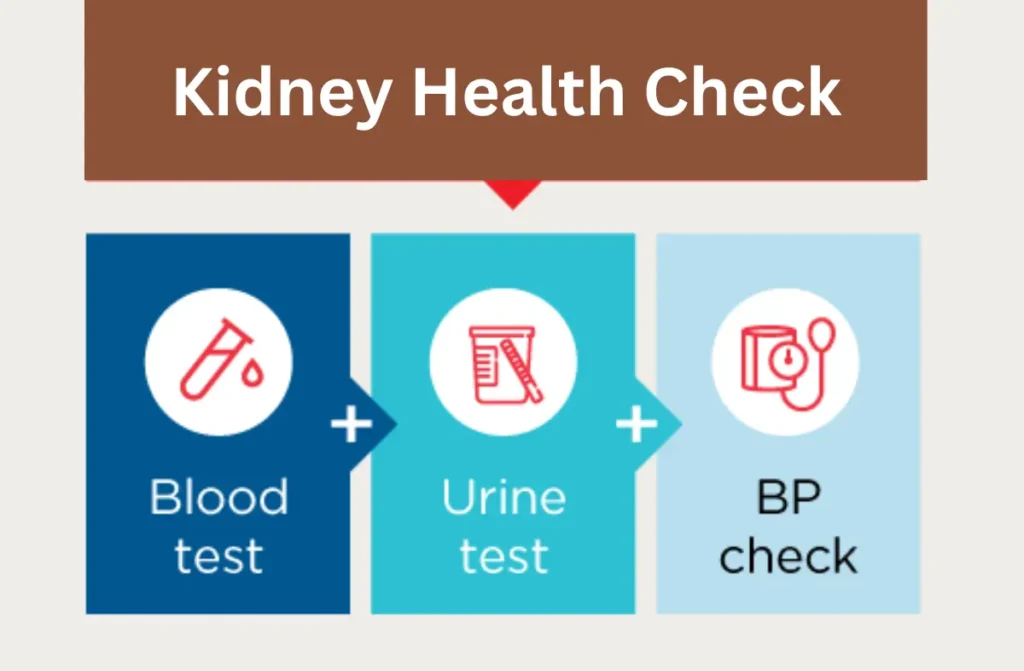Tests to check your kidney health are not just for people already diagnosed with kidney problems. They are for everyone. Your kidneys quietly work every day to clean your blood, balance fluids, and help control blood pressure. But when they start to fail, they often give no early warning. This is why regular tests to check your kidney health are so important. In this blog, you’ll learn how to understand the state of your kidneys using simple, effective diagnostic tools. These tests help detect issues early so that treatment can begin right away.
About Your Kidneys
Your kidneys are two bean-shaped organs that sit just below your ribs, on either side of your spine. They do many important jobs:
- Filter waste and excess fluids from your blood
- Produce hormones that control blood pressure and red blood cell production
- Balance minerals and water in your body
If your kidneys stop working properly, waste can build up in your body. This can lead to high blood pressure, weak bones, nerve damage, and even heart problems. That’s why it’s vital to have tests to check your kidney health done regularly, especially if you have risk factors like diabetes, high blood pressure, or a family history of kidney disease. Without your kidneys working right, your whole body can be affected. Think of these organs as silent workers—you won’t notice they’re in trouble until the damage is already done.
Blood Tests
Blood tests are among the first tests to check your kidney health. They help detect early signs of kidney damage or poor function. Here are the key ones:
1. Serum Creatinine
Creatinine is a waste product made by your muscles. If your kidneys are healthy, they remove it from your blood. A high level of creatinine can mean your kidneys aren’t working properly. It’s a simple blood test, and if the number is too high, your doctor may want to run more diagnostic tests for chronic kidney disease.
2. Cystatin C
This protein is also filtered by your kidneys. It can be more reliable than creatinine, especially in older people. It’s used in diagnostic tests for chronic kidney disease to confirm reduced kidney function. It helps double-check if the eGFR number is accurate, particularly if your creatinine level doesn’t match other signs.
3. Estimated Glomerular Filtration Rate (eGFR)
This test estimates how well your kidneys filter waste. It uses your age, sex, and creatinine or cystatin C level. An eGFR below 60 for more than three months usually means you have chronic kidney disease. This is one of the most important tests to check your kidney health. Doctors rely on eGFR to decide how bad the kidney damage is.
4. Blood Urea Nitrogen (BUN)
This test measures how much nitrogen is in your blood. High BUN levels can also be a sign of poor kidney function but might be influenced by your diet or hydration level. That’s why doctors don’t use BUN alone to make a diagnosis but combine it with creatinine and eGFR.

Urine Tests
Urine tests are another common way to check for signs of kidney damage. Here are the main types:
1. Urinalysis
This simple test checks for protein, blood, and sugar in your urine. The presence of these might be an early sign of kidney disease. It’s a good first step and can be done as part of a regular checkup. This is also used in many home test for kidney disease kits.
2. Urine Albumin-Creatinine Ratio (uACR)
This test looks for albumin (a type of protein) in your urine. Even a small amount can mean your kidneys are not filtering properly. It’s a key test for kidney disease. Repeated positive results usually mean you have early kidney damage.
3. 24-Hour Urine Collection
This test gathers all your urine over a full day. It measures how much creatinine and protein you pass and helps give a better picture of your kidney function. It can also help with genetic testing for kidney disease in some cases. Though it takes more effort, it gives a fuller view of your kidney function.
Imaging Tests
Imaging helps doctors see your kidneys and check for any structural problems. These are safe and pain-free ways to get more information.
1. Ultrasound
This test uses sound waves to create a picture of your kidneys. It can show if your kidneys are too large or too small, if there’s a blockage, or if there are cysts or tumors. It’s often the first imaging test for kidney disease.
2. CT Scan
A CT scan gives a more detailed image than an ultrasound. It’s often used if your doctor suspects stones, masses, or blockages. It helps identify causes of sudden changes in kidney function.
3. MRI
MRI gives even clearer images using magnets and radio waves. It’s helpful when you need a detailed look, especially before surgery or treatment. These scans can support diagnostic tests for chronic kidney disease by confirming physical changes in the kidneys.
Other Tests
1. Kidney Biopsy
This test involves taking a small sample of kidney tissue. It helps doctors find the cause of kidney problems and see how much damage has been done. A biopsy is often used when test results are unclear or when specific diseases are suspected. It’s often recommended when genetic testing for kidney disease is needed.
2. Measured Glomerular Filtration Rate (mGFR)
Unlike eGFR, mGFR involves injecting a substance into your blood and measuring how fast your kidneys clear it. It’s more accurate but used less often due to cost and complexity. This is one of the most thorough tests to check your kidney health.
How Much Does a Kidney Test Cost?
The cost of tests to check your kidney health varies. Basic tests like creatinine or urinalysis can be quite affordable, ranging from ₹300 to ₹800 in India. Imaging tests like ultrasound may cost ₹1,000–₹2,500. A kidney biopsy or mGFR test can be more expensive, from ₹5,000 upwards.
Some people prefer a home test for kidney disease. These usually include a urine dipstick to check for protein, and can cost ₹500–₹1,000. While convenient, they are not a replacement for clinical testing.
If you’re asking, how do you test for kidney disease, it depends on symptoms, risk factors, and your doctor’s advice. In general, blood and urine tests are the first step, followed by imaging or biopsy only if needed.
Conclusion
Tests to check your kidney health should never be ignored. They’re easy, often painless, and could help catch problems before they become serious. With tools like blood tests, urine checks, scans, and even home test for kidney disease, you have many options. Don’t wait for symptoms. Ask your doctor, “How do you test for kidney disease?” Stay ahead, and stay healthy.
Make these tests to check your kidney health a part of your regular check-up if you’re at risk. Early action could save your kidneys and protect your life. Knowing your eGFR and uACR could be the key to preventing major health issues in the future.




